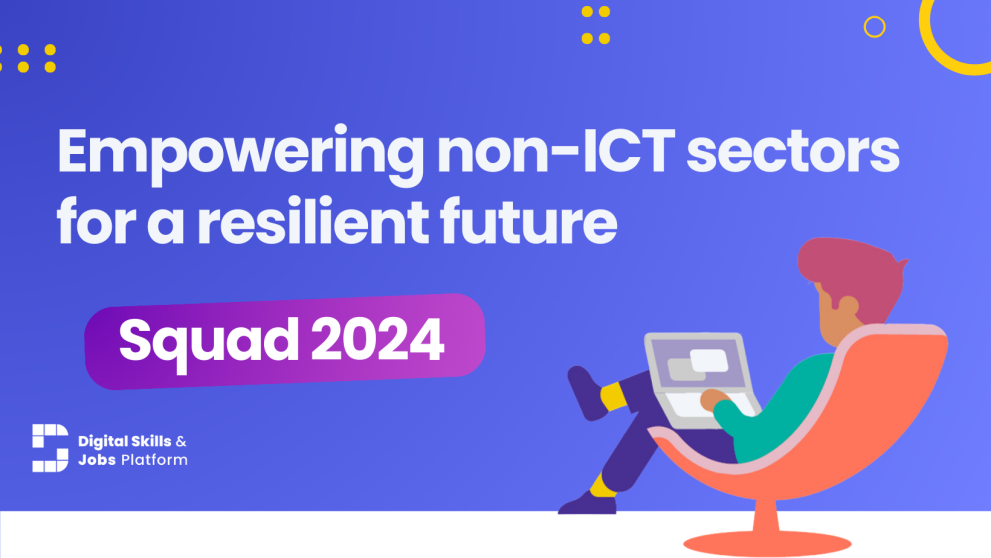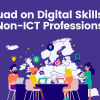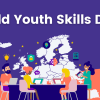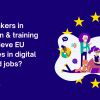Empowering non-ICT sectors for a resilient future: Squad 2024

From February to September 2024, the Digital Skills and Jobs Platform (DSJP) organised an online working group (Squad 2024) focused on enhancing digital skills in non-ICT professions. The group, comprising of 18 experts from across Europe, including Iren Bencze, Martina Bekeová, Anhelina Bykova, Artis Gustovskis, Robert Farell, Luis Fernandez- Sanz, Marija Renić, Mario Lelovsky, Manuel León Urrutia, Kamakshi Rajagopal, Philipp Ramin, Alessandro Tomasi, Marjana Prifti Skenduli who delved into crucial and engaging discussions on digital skills needs in non-digital sectors during a series of online sessions. The experts brought together a range of diverse perspectives from policy, industry, and technology, exploring the challenges and opportunities tied to the EU's digital skills agenda.
Equipping the citizens of tomorrow: an urgent call for digital proficiency across sectors
The urgency of addressing digital skills is highlighted by recent data: while over 90% of jobs in Europe now require basic digital skills, only 56% of Europeans aged 16-74 possess them as of 2023. This gap is a significant obstacle to theEU's Digital Decade goals, which aim for 80% of citizens to have at least basic digital skills and grow the ICT workforce to 20 million by 2030. Current projections suggest that if efforts remain unchanged, the EU risks falling short of its targets, with only an estimated 59% of citizens expected to meet the basic digital skills benchmark by 2030. To address these challenges, significant investments have been made, including €23 billion through the Recovery and Resilience Facility and associated national plans, and an additional €580 million from the DIGITAL Europe Programme.
The Digital Decade report and the Cardinal Points both emphasize the critical need for digital skills across all sectors, not just in ICT roles. This is particularly true in key industries like healthcare and agriculture, where the demand for specialists with advanced digital skills, referred to as 'digital integrators,' is growing. These professionals are pivotal in applying technologies like artificial intelligence (AI), augmented reality, and data analytics to improve outcomes, such as more accurate medical diagnoses or optimized production processes in farming.
Closing the digital skills gap with a resilient workforce
During the Squad 2024 sessions, 18 experts explored the current state of digital skills in non-ICT sectors, the frameworks that address these needs, and evolving policies across Europe. Their collaborative discussions culminated in the publication of a vision paper outlining the key findings. The vision paper calls identifies 4 major and transversal challenges: the lack of a cohesive framework for digital skills, the uneven adoption of AI, the ambiguity regarding responsibility and investment, and the growing digital divide, especially for smaller businesses and non-digital sectors.
Leaders must recognise that digital competencies are a combination of technical literacy and a blend of understanding and adapting to new tasks that arise in the context of digital and sustainable transformation.
To address these issues, the squad focused on proposing and defining strategies across macro, meso, and micro levels—targeting policymakers, organizations, and individual learners. The paper recommends the creation of adaptable frameworks that evolve with technological advances and ensure that workers acquire not only technical expertise, but also essential soft skills such as adaptability, problem-solving and continuous learning.
A unified approach to education for the future and lifelong learning
The vision paper calls for immediate, cross-sector collaboration between companies, educators and policymakers to redesign educational frameworks and develop industry-specific training programs. It is only by committing to flexible, future-focused strategies that incorporate both digital literacy and transversal skills that organizations can cultivate a workforce equipped to tackle today’s challenges and adapt to tomorrow’s demands.
The future of work will require a blend of digital competencies and transversal skills, such as adaptability, problem-solving, and continuous learning. Organisations must prioritize these skills across all sectors, ensuring that employees—whether in blue-collar or white-collar roles—are equipped to navigate the complexities of the digital age.
The paper also highlights the importance of fostering a culture of continuous learning, with leadership playing a key role in preparing the workforce for future demands. Ultimately, digital transformation must be understood as a cultural shift, not just a technological one, and requires a unified effort from all stakeholders to build a sustainable, inclusive digital economy.
Acknowledgement of the authors of the vision paper
While the paper builds upon the collaborative discussions held during the Squad 2024 meetings, the drafting process was led by:
- Iren Bencze, an AI Learning & Development Specialist, Researcher, and Writer with proficiency in adult education and the intersection of digital skills and workforce training in lean environment.
- Martina Bekeová - a medical student at Pavol Jozef Safarik University (UPJS) junior researcher at Neurological Department of UPJS and a student member of EAN Movement Disorders Scientific Panel and EAN Coordinating Panel on Rare Neurological Diseases.
- Anhelina Bykova - Doctoral Fellow of the Foundation for Science and Technology at the University of Azores, Portugal; a Researcher at the Centre of Applied Economic Studies of the Atlantic; a Member of the RightsTech Women Association in Geneva, Switzerland, and an Ambassador for EU Code Week in Portugal
- Robert Farell, Board member of the Compliance Institute, he runs a MSc in Digital Transformation, writes insightful articles and delivers thought provoking lectures and webinars on AI and the digital transformation overall.
- Luis Fernandez-Sanz Luis, Professor at Universidad de Alcalá since 2008, who holds a BSc and MSc in Informatics (1989) and a PhD with extraordinary award (1997), and has led 20 EU-funded research projects. He is the president of CEPIS, an expert on EU digital skills frameworks, and a former ICT SME CEO and consultant. Luis is the author of 2 deep-dives already published on the Digital Skills and Jobs Platform, Digital Jobs and Digital Experts.
- Manuel León Urrutia - a lecturer in the University of Southampton's top-ranked Computer Science department, holds a PhD and MSc in Web Science and is certified as a Data Ethics Facilitator. He leads learning at Southampton Data Science Academy, contributes to executive AI training, and has played key roles in multiple EU-funded projects.
- Kamakshi Rajagopal, an interdisciplinary researcher and consultant in educational design and technology. She holds a master’s degree in Linguistics and Artificial Intelligence and completed a PhD on personal learning networks in 2013. She develops and leads collaborative research projects on complex learning environments, teacher networks, and virtual mobility, and since 2023, she has focused on Learning and Development in IT and business consultancy. Dr Rajagopal has also explored the impact of Generative AI on coding and programming skills and the role of data in building a skilled workforce in 2 deep-dives, published on the Digital Skills and Jobs Platform.
- Philipp Ramin - CEO of i40 – the future skills company, leads training for over 800,000 learners globally in 50+ skills and 20 languages, earning multiple eLearning Awards. He serves on supervisory boards, directs a business degree in digitisation, contributes to the EU Digital Skills Platform, hosts the Digikompetenz Podcast, and edits publications on digital competence. Dr Ramin is also the author of an opinion on the Digital Skills and Jobs Platform on bridging the skills gap through innovative competence management approaches.
- Alessandro Tomasi, an Engineer, educator and entrepreneur. He advocates for collaboration rather than competition and is a keen observer of organisational and interpersonal social dynamics.
Thanks to the group's dedication and engaging discussions, we made a roadmap for policymakers, education and training providers, and public and private employees towards fostering a resilient workforce, capable of meeting the challenges brought by Europe's digital transformation, and bringing the EU closer to the Digital Decade goals by 2030.
You can access the full paper here. Happy swimming in the digital ocean!





